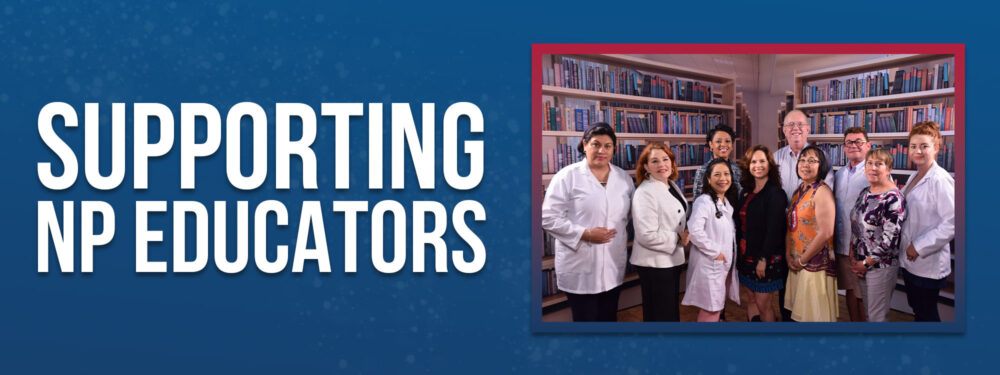Taking the Steps to Become a Nurse Practitioner Educator

Read on to hear from nurse practitioner educators and experience a 12-session program bundle that combines teaching and learning philosophy with evidence-based strategies for educators.
Nurse practitioners (NPs) with a wealth of clinical experience often find themselves contemplating a shift from patient care to the realm of academia, where they can impart their knowledge and shape the future of a new generation of NPs.
Entering an academic role after years away from the classroom can be daunting. Fortunately, the American Association of Nurse Practitioners® (AANP) has resources designed to set you up for success in an academic career — along with advice from NPs who have been there.
Mentees Becoming Mentors
During the 2023 AANP National Conference, several NPs interviewed emphasized the significant impact mentors have for new NPs in academia. “When I transitioned into my first role [as an educator], I had the theoretical knowledge behind what I was doing, but I had really great mentors that helped me transition into the role.” recalls Imelda Reyes DNP, MPH, FNP-BC, CPNP-PC, CNE, FAANP, acting dean and associate dean of advanced education at the University of Nevada, Las Vegas.
“When I first started in academia, the first mentor that I had, her name was Tammy, was amazing. She was really big about, ‘If you're going to be in academia, you have to publish, you have to present, you have to do lots of different things.’ She was great in the sense that she helped in those first publications which launched me off into my own thing.” Reyes paid that mentorship forward and has served in the same role as Tammy for other students. “Along the way, I've been able to coach other people, and work in writing teams to help them get published.”
Doncy Eapen, PhD, MSN, RN, FNP-BC, assistant professor at the department of undergraduate studies at the Cizik School of Nursing at The University of Texas Health Science Center at Houston, is another NP who believes a mentor is crucial in helping an NP transition into academia. “There are challenges, of course, when you are moving from a practice setting to an educator role. But those challenges can be overcome if you have orientation by having a mentor at the university setting.” Eapen believes that not having a mentor is disadvantageous. “People who do not have mentorship or do not have a mentor, they do not know how to move up in their career. If you don't have that guidance, it is very difficult.”
Forecasting a Bright Future for Health Care
Many NPs are inspired to step into academic roles is to ensure there are more providers to help with the crisis in health care access. Right now, more than 100 million Americans live in health care provider shortage areas. The good news is the NP role is projected to grow by 36% by 2026. It is crucial we have NPs transition from practice to academia to educate this coming workforce.
“We have seen how NPs can contribute to the overall health of the community, society or country as a whole,” continues Eapen. “NPs are also in a position to do research. If they don't take that next step, then we are not finding that new knowledge in all different areas of practice, like how to advance their role or how to make it better for the patients.” Eapen suggests NPs continue their educations and do research — which may include finding collaborators in the same research — and to find mentors. “Those are things that NPs can do,” she says regarding the important work of research and education. “And if NPs don’t do it, who else would do it?”
More Education Resources
AANP has developed an immersive program bundle aimed at NPs who aspire to become educators. The Education Leadership Certificate Program consists of 12 sessions covering diverse subjects, offering 11.16 hours of continuing education credit. Taught by faculty members Molly Jackson, DNP, APRN, CNE ACHPN, and Margaret Fitzgerald, DNP, FNP-BC, NP-C, FAANP, CSP, FAAN, DCC, FNAP, this activity is unique in its scope, with Jackson and Fitzgerald beginning with instruction to help learners develop a “personal philosophy of teaching,” and continuing to “identify practical steps to enhance student learning” with an emphasis on the adult pupil. The activity also defines and introduces concepts like “Backward Design;” exam and assessment rationales and strategies; and an introduction to the faculty role.

